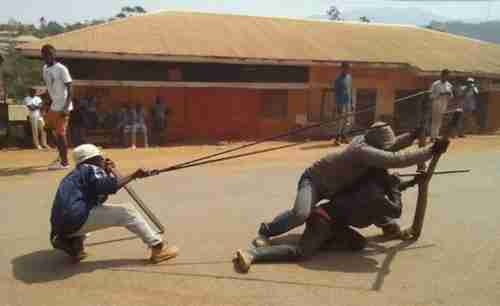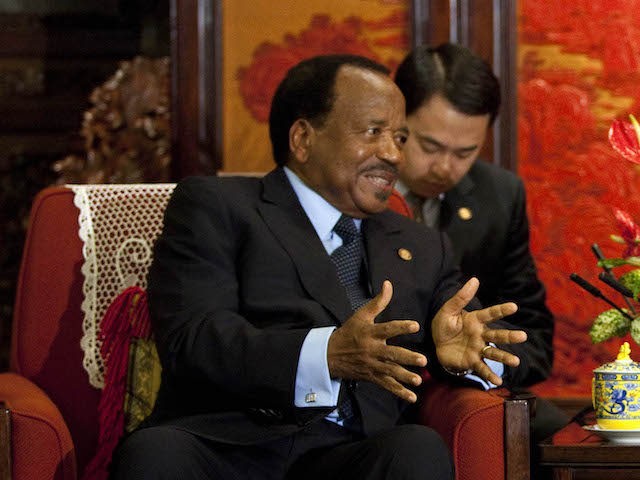This morning’s key headlines from GenerationalDynamics.com
- Cameroon’s president finally caves in, restores internet to English speakers
- With violence in Venezuela’s streets continuing, Maduro confiscates GM factories
Cameroon’s president finally caves in, restores internet to English speakers

During protests earlier this year, Anglophone protesters used catapult against police in Bamenda, Cameroon (RFI)
Cameroon’s president Paul Biya on Thursday finally gave in after 93 days and restored internet access to the “Southern Cameroons,” the region of Cameroon populated by English-speaking or Anglophone people.
Biya shut down the internet to Anglophones in November of last year, following clashes between English-speaking (Anglophone) protesters and police. The protests were over discrimination and marginalization of the Anglophones by the French-speaking (Francophone) majority.
The protests were initially led by Anglophone lawyers in the city of Bamenda to protest that the legal and court systems are biased toward Francophones, with many laws passed without even being translated into English. That demonstration was dispersed by security forces using tear gas.
Two weeks later, the demonstrators were joined by Anglophone teachers who were protesting that the government was deploying Francophone teachers teach the French language in Anglophone regions. The government decided was appointing French-speaking teachers and judges who barely understand English to Anglophone schools and courts.
Thousands of Anglophone Cameroonians brought coffins to the demonstrations, proclaiming that they were ready to die and be burned in their coffins. The demonstrations turned violent when security forces fired tear gas and live bullets to disperse the demonstrators. At least six protesters were shot dead and hundreds others arrested by security forces.
With teachers and lawyers on strike, shutting down the internet was apparently Biya’s method of bringing the Anglophones to heel.
However, shutting down the internet has been disastrous for Cameroon’s economy. It was particularly disastrous for businesses in the Southern Cameroons, which had no internet access, and so could not conduct business. But individuals were hurt as well, since they could not pay bills or make online purchases.
Shutting down the internet was a really dumb thing to do, but Cameroon’s economy has lost some $3.1 million because of the internet blackout, according to the French NGO, Internet sans Frontières (Internet without Borders). Furthermore, with the schools shut because of the teachers’ strike, Cameroon was threatened with an aid cutoff from UNESCO.
Biya’s ending the internet block will not solve the underlying tensions between Anglophones and Francophones, which date back to colonial times when there was a British Cameroon and a French Cameroon. The two colonies were pasted together in what was supposed to be a federal system where the Anglophone and Francophone regions were equal. But, Paul Biya came to power in 1982 and, as usual in African countries, Biya has turned into a dictator. He had hoped that shutting down the internet would make everyone happy and peaceful again, but instead it impoverished and infuriated many people, especially Anglophones. Cameroon Concord and Africa News and Anadolu (31-Mar)
Related Articles
- Brief generational history of Cameroon (15-Feb-2017)
- Cameroon: One person killed in English-speaking vs French-speaking civil unrest (23-Nov-2016)
With violence in Venezuela’s streets continuing, Maduro confiscates GM factories
Venezuela continued to be a showcase for the disastrous outcome of every Socialist government in history, as violence in the streets of Venezuela continued on Thursday, leading protesters to clashes with security forces who used tear gas, beatings, and other violence.
The protesters are demanding that president Nicolás Maduro hold elections so that he can be replaced, but like almost every Socialist leader in history, Maduro prefers to have the streets filled with rivers of blood than give up power.
As the economy continues to crash because of his Socialist policies, Maduro is forced to adopt increasingly desperate measures. Last month, he ordered the arrest of bakers because there was not enough bread available.
Previously, Maduro ordered the jailing of factory owners, but on Thursday, Maduro’s Socialist government seized a General Motors plant in Valencia. GM sales have been down in Venezuela because the Socialist government requires that they be paid for in near-worthless bolivar currency, rather than dollars. GM says that it will fight the seizure in Venezuelan courts, but since Maduro controls the courts, GM is unlikely to succeed.
Venezuela’s Socialist government has nationalized a number of US companies, or otherwise forced them out of business. Other companies that have cut back or ceased doing business in Venezuela include Kimberly-Clark, Exxon Mobil, Ford Motor Company, Clorox Co. and Bridgestone Americas. It has been a policy of Socialist Venezuela to destroy as much of economy as possible, in order to be able to nationalize businesses. As the old Socialist saying goes, you have to crack a few eggs to make an omelet.
As violence increases in the streets, fears are growing that Maduro will call out the army for a full-scale assault on the protesters. However, some reports indicate that there’s a growing split within the army, with many soldiers reluctant to attack ordinary Venezuelan citizens including, in some cases, their own family members. Detroit Free Press and Miami Herald and AP
Related Articles
- Venezuela’s Socialist government arrests bakers because of bread shortage (20-Mar-2017)
- Venezuela’s economic crisis is hitting Cuba hard (06-Aug-2016)
- Hugo Chávez dismantled Venezuela’s businesses on purpose to create Socialist Paradise (29-May-2016)
KEYS: Generational Dynamics, Cameroon, Paul Biya, Francophones, Anglophones, Southern Cameroons, Internet sans Frontières, Internet without Borders, Venezuela, Nicolás Maduro, General Motors
Permanent web link to this article
Receive daily World View columns by e-mail

COMMENTS
Please let us know if you're having issues with commenting.